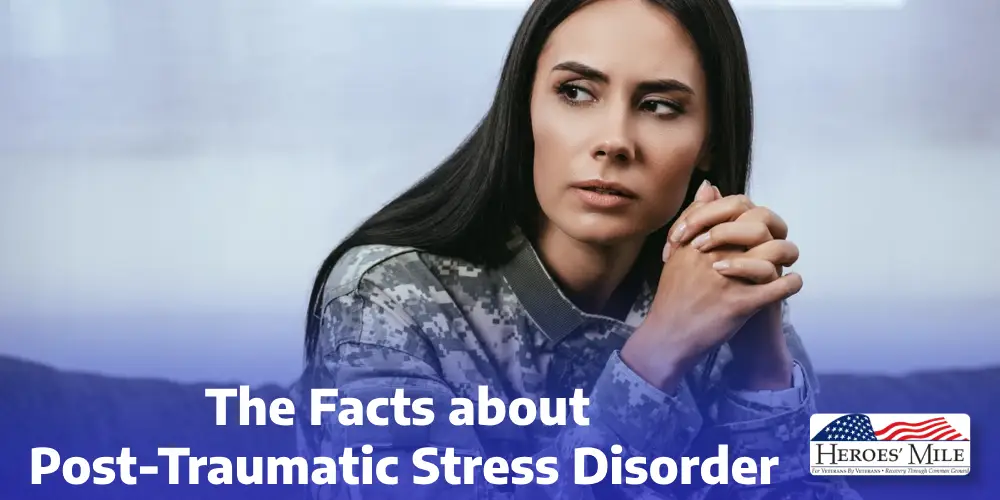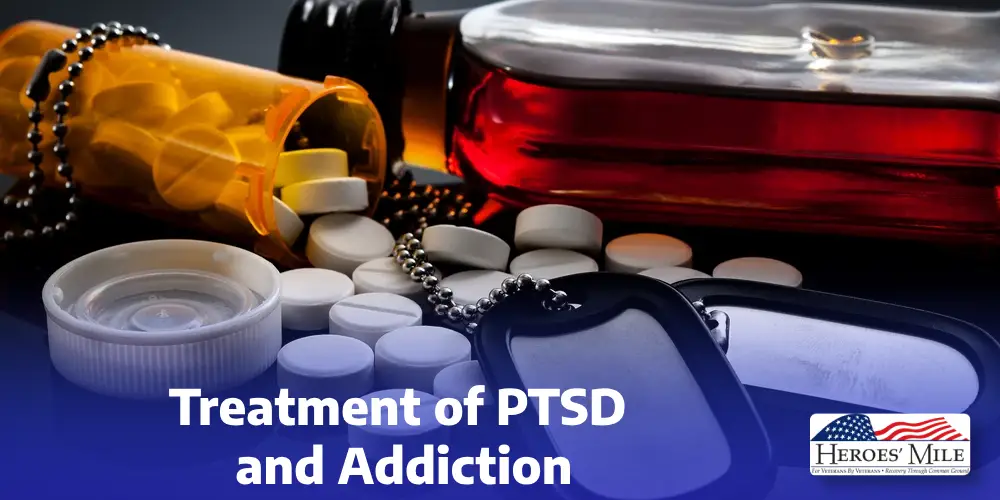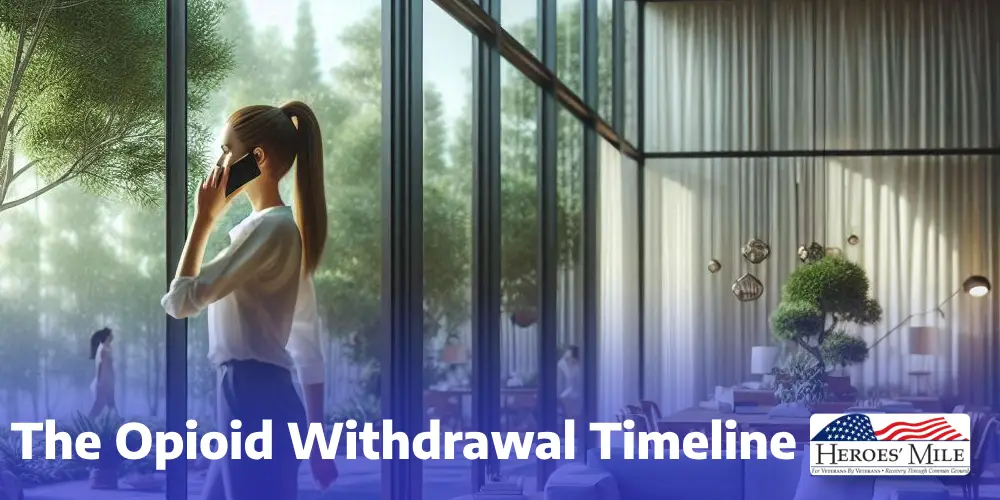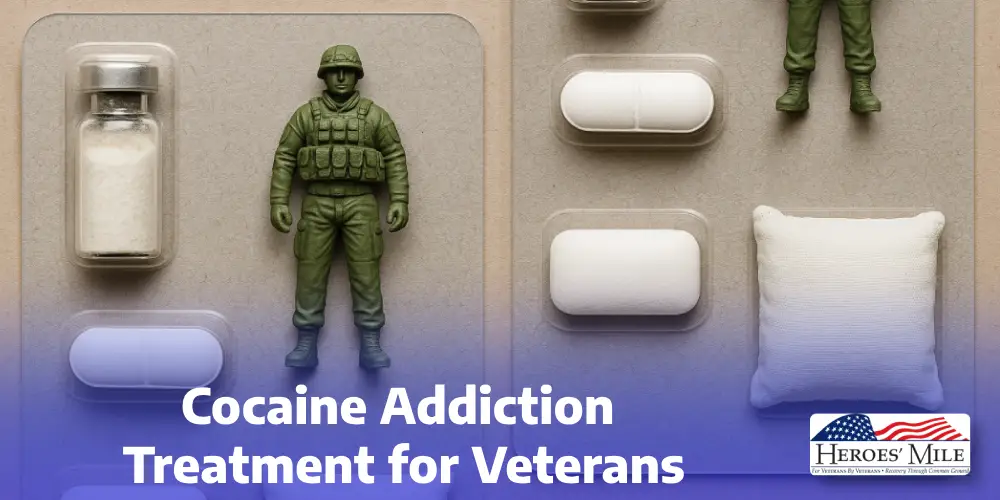Many people who struggle with post-traumatic stress disorder (PTSD) substance use disorders also have symptoms of mental health struggles. Though treatment options for co-occurring substance use disorders continue to improve throughout the country, treating post-traumatic stress disorder (PTSD) and substance use disorders is a specialized task.
This article details everything you need to know about the link between post-traumatic stress disorder and addiction, and how veteran-friendly addiction centers can help you.
The Facts about Post-Traumatic Stress Disorder

The Facts about Post-Traumatic Stress Disorder
Post-traumatic stress disorder is a mental health condition that can occur after experiencing a traumatic event. You might be at risk to develop PTSD in high-stress environments, such as combat or other life-threatening situations.
After experiencing a traumatic event, our brains have found ways to protect themselves from reliving the trauma and danger of the situation. This often results in avoidance symptoms, intrusive thoughts and memories, and severe emotional and physiological reactions to triggers.
Though most people will feel discomfort and emotional distress after experiencing a traumatic event, PTSD is diagnosed when these feelings do not improve over time.
There are many harmful stereotypes about people with PTSD, but the truth is that this condition annually affects upwards of millions of veterans. It is important to know that PTSD is nothing to be ashamed of, and neither is seeking help.
In fact, there are many new treatment options to address severe symptoms of PTSD. Treatment is proven to help those suffering with Post-Traumatic Stress Disorder by introducing effective coping strategies.
Yet, when you are struggling with PTSD and addiction, it is important to find the right treatment centers that provide treatment of PTSD alongside addiction treatment.
Are Post-Traumatic Stress Disorder and Addiction Connected?
The short answer is yes: PTSD and addiction are often connected to one another. But why is this the case for so many people with PTSD?
The symptoms of PTSD can range from person to person, but many times include:
- Persistent feelings of anxiety
- Depression
- Inability to do everyday activities
- Occurrence of flashbacks and triggers
- Avoidance symptoms
- Physical and emotional distress
- Dependency on drugs and alcohol
For veterans living with PTSD and addiction issues, these symptoms can interfere with their ability to work, socially interact, and simply enjoy their lives. When people with PTSD experience these symptoms on a daily basis, it becomes challenging to function. Thus, many patients turn to unhealthy coping mechanisms, such as self-medicating using drugs and alcohol.
According to the U.S. Department of Veterans Affairs, 20% of veterans who suffer from PTSD also struggle with a substance use disorder (SUD). Additionally, the VA states, “Almost one out of every three Veterans seeking treatment for SUD also has PTSD.” These statistics speak to how common it is for people with PTSD to also struggle with addiction.
Turning to drugs and alcohol might feel like the only solution to avoid the distressing symptoms following a traumatic experience. However, using these substances will not ever fix the root cause of the trauma and it only serves as a way to cover up these dangerous symptoms.
This is why having access to proper treatment of PTSD and addiction is crucial to the survival and success of veterans.
Treatment of PTSD and Addiction

Treatment of PTSD and Addiction
Addiction treatment often begins with a detox process to eliminate the harmful, addictive chemicals from the body. However, in the case of dual diagnoses, such as addiction and co-occurring PTSD, treatment centers must address both issues simultaneously to ensure an effective detox.
However, some treatment facilities offer addiction treatment without specializing in post-traumatic stress disorder. This can be detrimental for service members who suffer with PTSD because it does not address the trauma and emotional distress. Be sure to look for treatment options that are specific to your experiences as a veteran in order to find the most effective recovery path.
It is important that the detox process is followed up by specialized services. These might include:
- Group therapy
- Individual therapy
- Art therapy
- EMDR therapy
- Educational sessions to learn job skills
- Dietary support
- Recreational activities
For our veterans at Heroes’ Mile, we offer the best treatment options to bring comfort to your healing process. This includes 24/7, on-site care from the top addiction specialists, physicians, and mental health professionals. Additionally, we highly value your privacy, and all personal information is completely confidential. Our staff is here to work with you and help start you on the path to recovery.
Cognitive Behavioral Therapy as Treatment of PTSD
Cognitive behavioral therapy (CBT) is another therapeutic technique that can be extremely beneficial for veterans who are suffering from PTSD and addiction. For those suffering from alcohol or drug addiction who have received a PTSD diagnosis, enrolling in a treatment program that offers CBT can make all the difference.
CBT is an umbrella term that refers to a series of therapeutic methods that work to connect mind and body as a way to regulate one’s behaviors, thoughts, and feelings. These are learned skills that ask patients to practice mindful, attentive thinking patterns.
One of the many goals with cognitive behavioral therapy is to replace negative thought patterns with healthier ones. The idea behind this practice is to retrain your brain to think in a way that will benefit the feelings and behaviors that will follow.
CBT can be particularly useful for veterans with PTSD, as it involves reprocessing trauma. This helps to fight off avoidance symptoms and addresses the core problems head-on. The patient will learn coping strategies to respond to triggers, which will ultimately give them more control over their feelings and behaviors.
When patients use CBT to practice a healthy mind and body connection, they often find relief in all areas of their life. This means that they are less likely to turn to drugs and alcohol to mask the pain.
PTSD and Addiction Treatment That Works
Our dedicated staff at Heroes’ Mile consists of professionals and experts who are able to answer your questions about having PTSD and substance abuse issues.
In fact, we are a team of veterans who specifically work to help other veterans. We know how challenging it can be to find the right treatment options, and we are here to offer support.
FAQ
- What are the most effective treatments for PTSD and addiction?
The most effective treatments include trauma-focused therapy, medication-assisted treatment (MAT), cognitive-behavioral therapy (CBT), and holistic approaches like mindfulness and exercise. - Can PTSD and addiction be treated at the same time?
Yes, many rehab centers offer dual diagnosis treatment programs that address both PTSD and substance use disorders simultaneously for better recovery outcomes. - What medications help with PTSD and addiction recovery?
Medications like SSRIs (for PTSD symptoms) and MAT options such as methadone or buprenorphine (for addiction) can help manage symptoms and support long-term recovery. - How does trauma therapy help with addiction recovery?
Trauma therapy, such as EMDR or prolonged exposure therapy, helps individuals process past trauma, reducing the need for self-medication through drugs or alcohol. - Where can I find treatment for PTSD and addiction?
You can find treatment at specialized rehab centers, mental health clinics, and hospitals that offer integrated care for trauma and substance use disorders.



